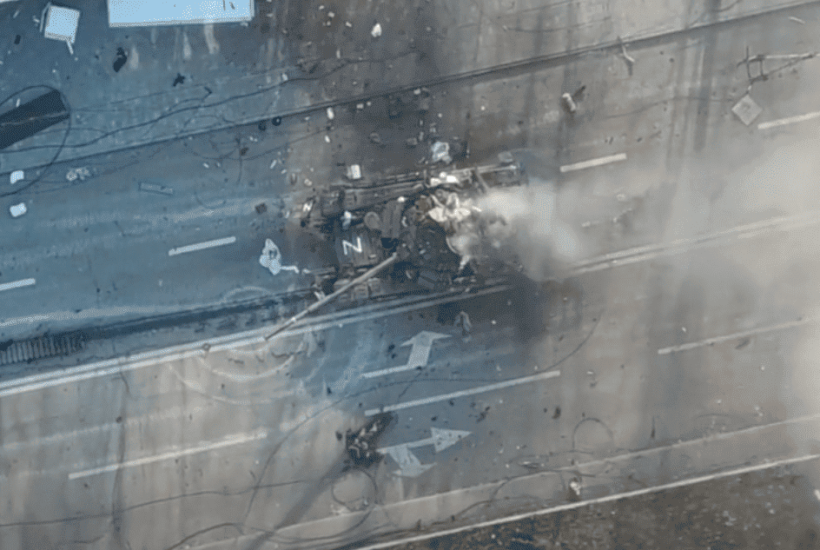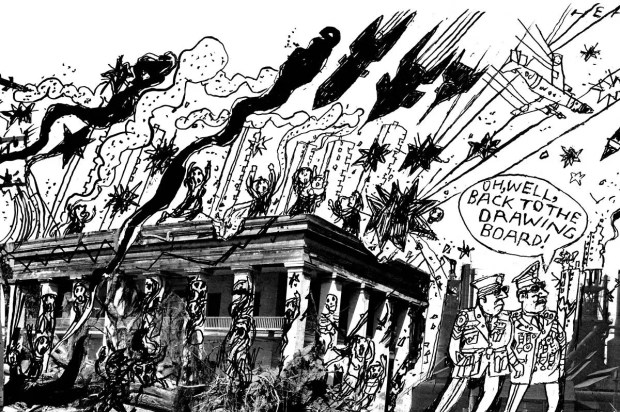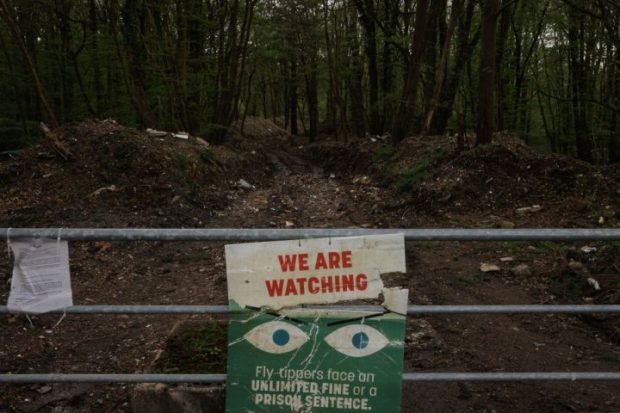It is an almost unquestioned orthodoxy that war is hell, and that every needless death in a needless war diminishes our common stock of humanity. It’s curious, though, how we’re able to hold that conviction alongside a positively visceral excitement at watching the Ukrainian counter-offensive carve its way through the Kharkiv Oblast. Some 3,000 square kilometres have been recaptured: Ukrainian troops are moving through their own land at such a clip that they’ve made more progress in three days than the massed might of the Russian invaders have since April.
I’ve been eating it up. Haven’t you? The images of abandoned armour, the fuel dumps, the sullen faces of Russian commanders rounded up as prisoners of war. Those lines and arrows on the maps, telling us that this bridge has been destroyed, that weapons dump annihilated, that pocket of troops encircled and stranded on the wrong side of the river, this pocket of troops routed and running leaving a trail of plundered white goods in their wake. Shaky mobile phone footage shows Russian airfields and ammo dumps going up like firework displays. Kupyansk, then and therefore Izyum; and after Izyum, what next?
We civilians aren’t qualified to say, but it’s human to hope that we’re seeing dominoes tumbling – and we seek out the military analysts who can give expert support to that hope. We rejoice alongside the Ukrainian civilians we see lining the streets in tears of joy as they welcome into their villages the countrymen who have driven the Russians out. And it’s futile to pretend there isn’t a direct thrill in witnessing the strategic daring of the Ukrainian command and the courage of their soldiers.
There come to mind the stirring words of General Patton to his men when they were rolling up the Nazis in occupied France: ‘We’re not holding a goddamned thing. We’re advancing constantly and we’re not interested in holding anything except the enemy’s balls… We’re going to go through the enemy like shit through a tinhorn.’
Vanished from consciousness, or nearly vanished, are sympathies for the under-trained Russian infantry who didn’t have much choice in the war. Six months back, they thought they were headed for a training exercise in Belarus, only to find themselves on the highway to Kyiv being shot at by young men who might be their cousins or shamed in the street by old women who might be their grandmothers. Tens of thousands, and counting, are now reported to lie dead. Tant pis, our lower natures think, they’re the enemy now. We see their tanks brewed up and we whoop. I don’t deprecate this, I only note it. It’s the nature of the thing. This war is of the deepest importance, but despite that – maybe even because of it – we consume it as something uncomfortably like entertainment.
But as a nation, we’re not just spectators. A few months ago, even a few weeks ago, there was a realpolitik argument that our support for Ukraine should be considered a strategic risk. If Russia’s triumph was inevitable, what profited us to spend all that blood and treasure supporting the losing side in the invasion? Would it not prolong the suffering? Sure, this argument said, resisting the Russians was the right thing to do: it is as nearly a black-and-white case of good and evil as history throws up when an autocracy launched an unprovoked and illegal invasion of a democratic neighbour on a flimsy and historically illiterate pretext.
But, the argument said, how long should we do this right thing, and at what cost? It’s not our fight, the argument said. We’re going to have to make nice with Russia sooner or later, the argument said. Should we not, with regret, do what we did in 2014 and make our disapproval clear but yield to geopolitical reality? Keeping the lights on in Manchester is a bigger priority for the UK government than delaying the inevitable in Mykolayiv.
That argument seems to be losing ground by the day, by the hour and by the minute. The remarkable reversal in Ukraine’s fortunes, it seems to me, makes the case that it’s not only right to ramp up our support: it’s in our own medium- and long-term interests. Momentum is with Ukraine. The bully has a bloody nose. The more precipitously Russia’s troops collapse, the less likely that Putin will even consider saying boo to a goose in future. Indeed, we can hope that this means it won’t long be Mr Putin whose wariness around geese will concern us.
Experts seem to agree that the speed of the Ukrainian advance is a testament to the difference that western military aid has already made. There is no question that the greatest credit should go to the brilliance of Ukraine’s command and coordination.
There’s no question, too, that Ukraine’s soldiers fight with the bravery they do because they are defending their homeland. They have no fall-back plan, no other place to live, and they are absolutely unwilling to submit to live and have their loved ones live as subjects of Vladimir Putin’s repulsive regime. It hasn’t hurt, come to that, that the Russian armed forces have turned out – as perhaps you’d expect given the corruption and complacency of the regime – to be lousy at warfighting.
But those advantages have been supercharged by their having better kit, better communications and perhaps some discreet intelligence help from the western powers. The Himars, the Javelins, the NLAWs, the Brimstones, the Starstreaks, the drones… all these bits of expensive kit have shifted the balance of power. The Ukrainians have been brilliant at targeting Russian logistics – but they’ve only been able to hit them there because western technology has given them the reach.
We should be digging out every weapons system we can find down the back of the sofa, in other words, and overnighting it to Volodymyr Zelensky. The financial cost of doing it now is high; but the financial and political cost of not doing it will be a lot higher in the long run. Now is the time to throw better money after good. Give them the tools, as the saying goes, and God willing they will finish the job.
Got something to add? Join the discussion and comment below.
Get 10 issues for just $10
Subscribe to The Spectator Australia today for the next 10 magazine issues, plus full online access, for just $10.




















Comments
Don't miss out
Join the conversation with other Spectator Australia readers. Subscribe to leave a comment.
SUBSCRIBEAlready a subscriber? Log in